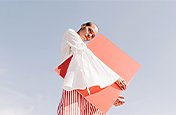Inspire confidence with boudoir photography.
Learn how boudoir photographers create beautiful images of people in intimate settings. And discover the art of taking sensual photos that capture the essence of anyone.

Photo by Cindy Johnson
Boudoir shoots are about more than sexy poses.
Named for the private bedroom setting where they typically take place, this type of portrait photography focuses on the seductive or romantic side of someone, who is usually posed partially nude or in lingerie. But traditional sex appeal is not the only goal. Boudoir photography sessions are also about stripping down emotionally and getting photos that showcase people’s vulnerability or passion.
“Photography is about taking pictures of souls,” says Cindy Johnson, a boudoir photographer based in Indiana. “And it’s much more about getting your mind naked than getting your body naked. Photographing someone nude or in lingerie can help to shake them out of their comfort zone and bring down this facade we all have,” she says. “To me, it’s really capturing all sides of a person. I don’t want to focus on just the sexy side.”

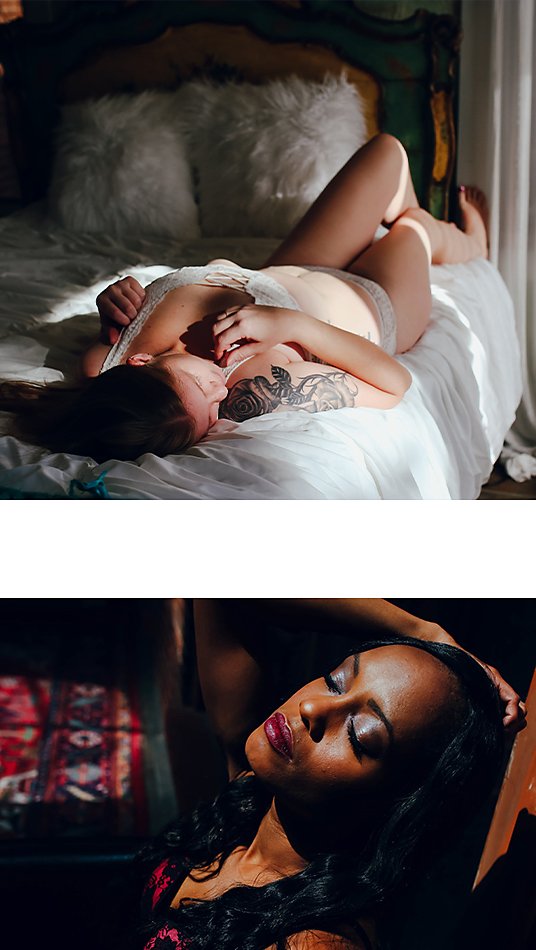
Photos by Cindy Johnson
Empower every body.
Most boudoir pictures are taken of women in stereotypically feminine poses. However anyone, anywhere on the gender spectrum, can use a boudoir session to express a side of themselves typically seen only behind closed doors. Boudoir photoshoots are often purchased as a gift for a special someone, but they’re also an amazing way for clients to celebrate themselves. Bethany O’Connor runs a boudoir photography studio in Rhode Island. “A lot of times people start out doing it as a gift to their significant other,” says O’Connor, “But they’ll later say, ‘I had no idea it’d be such a gift to myself too.’”
Boudoir images can build up a subject’s confidence.
These photo sessions can unlock new levels of confidence in the people you photograph, but they can also bring up insecurities and discomfort for those not used to posing this way. Because of that, it’s more important than ever to build up your own confidence as a photographer before you bring paying clients into your boudoir studio. Your self-assurance behind the camera will help to inspire their bravery in front of it.
“I encourage anybody who’s considering doing boudoir work to shoot as much as they possibly can,” says O’Connor. “The more you shoot, the more you’ll grow your art and your own confidence and that confidence will be contagious to clients.”
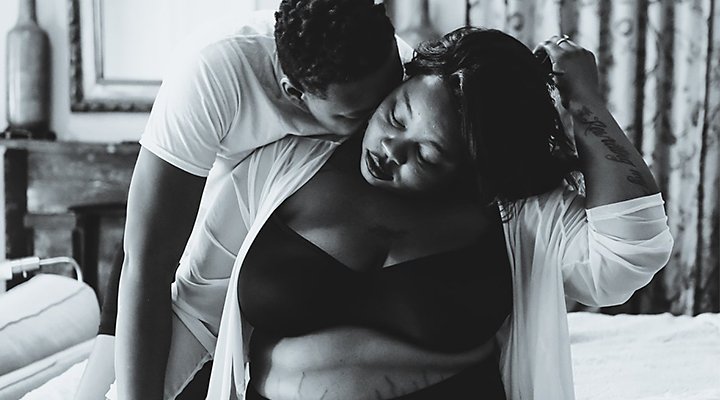
Photo by Cindy Johnson
Prepare for boudoir photoshoots.
Before you dive into this art form, get ready to answer a myriad of questions about the boudoir experience. It can help to write out some policies and suggestions on your website and to have a consultation phone call or video chat with clients before their shoot.
“The hardest part for the client is booking the shoot,” says Johnson. She recommends including a nonrefundable retainer fee in your policy to help prevent clients from cancelling at the last minute out of nervousness. “People will say, ‘I wish I had the bravery to book a shoot,’ and I’ll say, ‘It only takes 30 seconds of bravery and then you’re set, because if you don’t come, you lose your money.”
You may choose to work with a hair and makeup artist as part of your package or leave that up to the client. The important thing is for your client to feel happy with their look. “If somebody doesn’t like their hair and makeup, they’re not going to like their photos,” says O’Connor.
The same goes for wardrobe. Confidence is key. Offer basic tips for dressing on your website or via email before you get started. “I like clients to bring in five to seven outfits. We usually shoot about four,” says O’Connor. “It’s good to have more options than we need in case something doesn’t photograph well.” Some more wardrobe tips from O’Connor? Give bodysuits a try and never underestimate the power of a good pair of shoes.
Many boudoir photographers work out of a home studio. All you need is a private room, some natural light, a piece of furniture and music to lighten the mood. Some helpful items include a bed or air mattress, a couch, a chair and some wall art or a tapestry for the background. Shoot in a room with windows to take advantage of natural light. But have a scrim on hand to help diffuse the sunlight when it’s too intense.
An air mattress is a great option, since you can easily move it around the room and they’re often quite firm. But be sure it looks like a real bed when it’s made. If you’re using a real mattress, try putting a piece of plywood under the bedding to make it easier for your subject to pose on it without sinking in.
Have fun with your props but remember that simple is best and fancy isn’t a requirement. “Don’t be too concerned with having the perfect furniture,” says Johnson. “No one’s coming to me because they like my couch. Clients will come to you because they see that you make people feel amazing.”

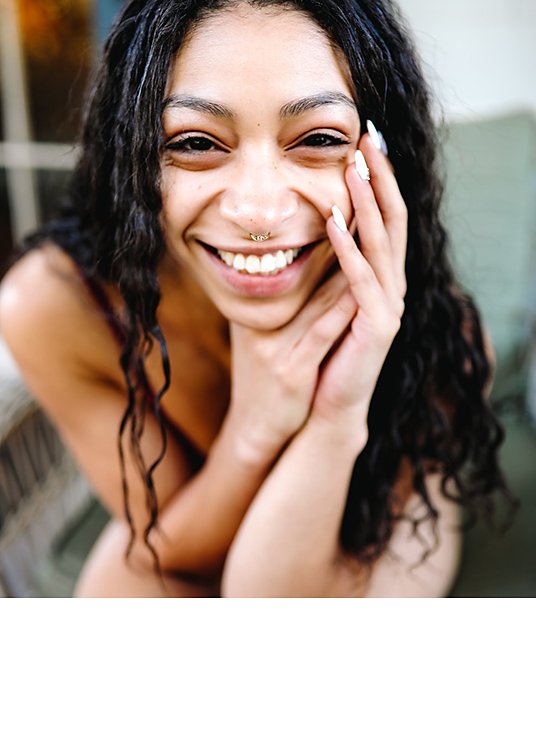
Photos by Cindy Johnson
Shooting boudoir photography.
Especially when you’re first getting started, having a shot list is helpful. Find boudoir images you like online and ask your client to make a Pinterest board of photos that speak to them. This can help to guide your shoot and help you to get to know your client. Knowing your subject and allowing them to get to know you is essential to a successful session. Chat with your client and ask plenty of questions. A friendly approach will help to get them out of their head.
Put on some music to help lighten the mood. You don’t want music that is “sexy,” you want music the client loves. Ask what their favourite music is and create a playlist from there. “I’ve shot to every kind of music there is, because it’s not about me being comfortable; it’s about them being comfortable,” says Johnson.
As you practise shooting and study photos online, you’ll learn what poses work best. But it’s also important to study how your client moves naturally, so you can see what might bring out their personality. Some of the best images are candid photos taken in the in-between moments.
“I watch people as they walk in the studio, how they’re moving, what they’re wearing and I can get an idea of what poses might work for them,” says Johnson. “My favourites are the moments between the poses. When they’re getting ready to go to the next pose, I can really see who they are.”
Once you’ve started, experiment with camera angles to get the most out of each pose. And give the client a lot of verbal guidance so they don’t have to guess at what to do. “You can’t just say, ‘Look sexy,’ because no one knows what that means,” says O’Connor. “I do every pose along with them and give constant feedback. Subtle tweaks like pointed toes can be the difference between a good shot and an amazing photo,” she says.
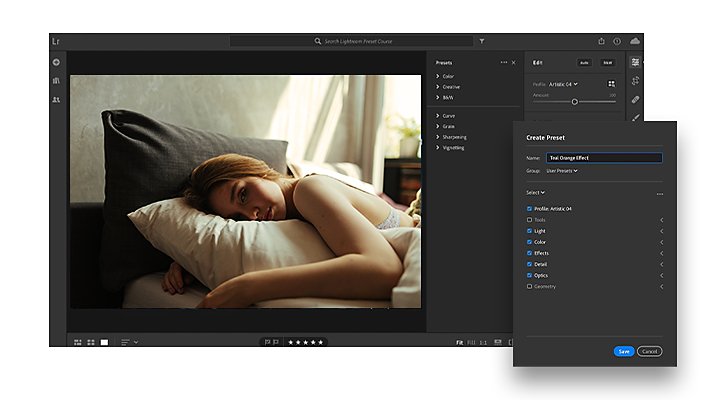
Editing boudoir photography.
Make sure you’re not retouching the subject too much, so you preserve their natural look. “I have a very light editing touch. I like to celebrate scars. I think there’s no such thing as an imperfection,” says Johnson. “Your body is like a map of your journey through life and I don’t want to erase that map.”
Find an editing style that works for you and streamline it where you can. Practice speeds up your editing time and so do things like saving your own customised presets in Adobe Lightroom. “At first, I would set my timer for 60 seconds and say, ‘This is my limit for working on this photo,’” Johnson says.
Get started in boudoir photography.
It doesn’t take any professional photography experience to build your portfolio. Do free shoots for friends and acquaintances and build a website to showcase your work. Represent people of all body types and personalities and you’ll attract a wider range of clients. People want to see that you’ve worked with people like them, not just typical model types. “You’re going to book what you show in your portfolio,” says Johnson.
When you practise, you can develop your own unique style. “Your work doesn’t have to look like anyone else’s,” says Johnson. “Be yourself. Clients are going to get naked with you and if you aren’t being ‘naked’ about who you are with them, then you’re going to seem fake.” Shoot in a way that makes you happy and you’ll be able to see that joy reflected in your client and your work.
Contributors
Do more with Adobe Photoshop Lightroom.
Edit photos easily with Lightroom presets, Super Resolution, easily share photos from any device and access your projects anywhere with cloud photo storage management.
You might also be interested in…
Creating great portrait photography.
Take a step closer to perfect portraits with tips and advice from professional photographers.
Tips for effective hand poses and sitting poses.
Learn methods for effectively photographing human hands and seated subjects.
Fashion photography tips for beginners.
Learn what makes shooting fashion unique and see how to create stunning shots that shape culture.
Fashion photography tips for beginners.
Learn what makes shooting fashion unique and see how to create stunning shots that shape culture.
Get Photoshop Lightroom.
Edit, organise, store and share photos from anywhere.
7 days free, then NZ$ 19.32/mo incl GST.


